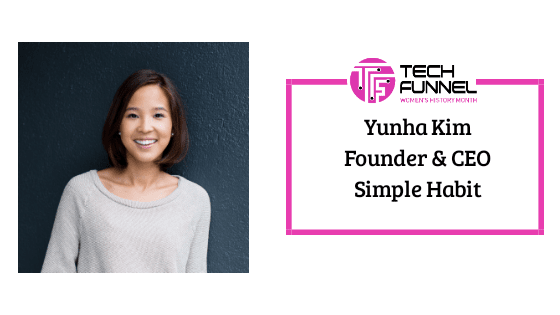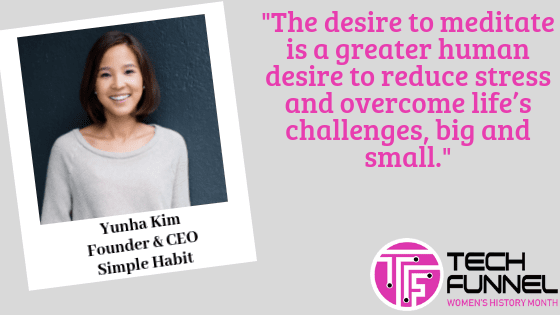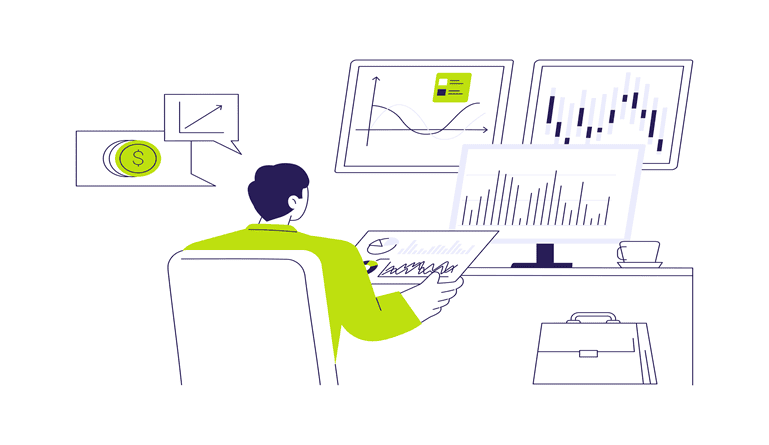Women’s History Month Interview Series 2019
Welcome to TechFunnel.com’s interview series for Women’s History Month where we are celebrating female executives, CEOs, business owners, and creators across various industries.
Joining us today is Yunha Kim.
Yunha Kim is the Founder and CEO of Simple Habit, an award-winning app for daily stress relief.
With more than 2,000 sessions based on situations like sleeping, morning anxiety and lack of focus, Simple Habit offers a practical solution for modern lifestyles. Busy people rely on Simple Habit’s short meditations and audio therapy sessions from world-class experts to reduce daily stress.
Founded in 2016, Simple Habit is now the #1 rated meditation app in the App store and 2018 Google Play Award Winner for Standout Wellbeing App. The app boasts 38,000 five-star reviews. Simple Habit has raised $12.8 million from investors including Foundation Capital, Y Combinator, New Enterprise Associates (NEA) and many other prominent CEOs in Silicon Valley including Dropbox’s CEO Drew Houston and Gusto’s CEO Joshua Reeves.
Kim began her career in investment banking and built her first startup Locket when she was 23-years-old. Kim began to meditate to help manage the stress of startup life. The idea to build a more diverse, practical meditation app came to Kim when she was pursuing her MBA at Stanford. She dropped out of Stanford after one semester to build Simple Habit into the leading meditation platform for busy, stressed-out people. In 2017, Kim was honored by Forbes 30 Under 30 and Marie Claire’s New Guard.
In this interview, Yunha shares with us the moment she knew her business idea was worth taking a risk on, how to pitch to and win investors, and how she wins people over to simple meditation as a habit.
Take it away, Yunha!
Danni White: Tell us a little bit about yourself, your background, and how you navigate life as a successful tech entrepreneur.
Yunha Kim: I was 14 when I left Korea to attend boarding school in the U.S. At the time, I didn’t know how to speak English. Being away from family at a young age was hard. The language barrier proved to be even more challenging. I was impelled to quickly learn English in order to keep up with high school reading materials and communicate. I learned a lot through the experience – how to get comfortable with uncertainty, how to work hard. Most notably, I learned that no challenge is too big for me to overcome.
I attended Duke University for undergrad where I majored in Chinese and Economics. I moved to NYC, worked on Wall Street and quickly decided to build my first company. I found investors like Tyra Banks and eventually sold the company. I then attended Stanford GSB but dropped out to build Simple Habit into the destination people trust for their mental wellness.
DW: You were just 23 when you left your job as an investment banker on Wall Street. When did you know your idea was worth taking a major risk?
YK: I started my first company, Locket, when I was 23. I left my previous job in investment banking knowing that I might be out of a job if Locket didn’t succeed. My thought process was simple – I had the least amount of risk in my early 20s. My market salary was low and I didn’t have a family to feed. If there was any time to take a risk, that seemed like the best time. My excitement triumphed a fear of failure.
DW: Before starting Simple Habit, you founded Locket and raised $3 million from investors. What advice would you give young entrepreneurs about pitching to and winning investors?
YK: Find the right investors who are going to be a long term partner. It’s almost like a marriage, as long as the company exists, they are your partner in this journey. It’s not just about money, but making sure you have similar values. You’re also interviewing them.
Be mindful of why you’re raising. Be sure of it. When I built my first company Locket, I just thought you had to raise to assert legitimacy. I bootstrapped for the first year that we were building Simple Habit. I wanted to make sure this was company I would be committed to building for many years. With investors come a ton of responsibility, remember that when you’re raising you have to be committed and prepared to answer for the long haul.
DW: How did Simple Habit come about?
YK: Simple Habit was born from my personal struggle with stress. Back in 2014, I experienced a burnout while building my first company. My work stress was impacting my relationships, health, and overall well-being. I started meditating daily and it changed my life.
I was power using other apps and at that time most meditation apps only had one teacher on the app. I got tired of hearing the same voice. I remember thinking – I don’t download a new app to listen to each of my favorite artists, and artists like Justin Bieber don’t create an entire app to share their music. Instead, platforms like Spotify make it possible for musicians to access a bunch of listeners and vice versa. When I started talking to meditation teachers to see where they were sharing their content, I realized there was a void in this space. So, I set out to create the Spotify for meditation – a two-sided marketplace where experts could reach more people and where busy people could discover 5-minute meditations for any situation or mood.
I bootstrapped for the first year, using my entire savings to hire an engineer, build the app and recruit our first batch of world-class meditation experts. I wanted to prove the business model first and see a product market fit. When I realized we had a viable product, I dropped out of Stanford GSB to focus full-time on building Simple Habit into THE destination people trust for their mental wellness.
Today, millions are using our product and we have over 38,000 five-star reviews raving about how Simple Habit has changed their lives. We graduated YCombinator in 2016 and again this year, when we raised our series A led by Foundation Capital. In the last year, we’ve grown 10x and are now generating over $6 million in annual recurring revenue.
DW: Some people tend to be hesitant to try meditation especially if they don’t know what it is. How do you win them over?
YK: At Simple Habit, we’ve learned that beyond the desire to meditate is a greater human desire to reduce stress and overcome life’s challenges, big and small. That’s why we offer bitesize meditations that focus on context. Meaning, we create meditations you can use based on where you are, what you’re doing or how you’re feeling. A few great examples are Before A Date, Overthinking, Can’t Sleep.
DW: How have you built a routine for your own personal and professional meditation?
YK: Yes. I believe every entrepreneur needs to invest in herself. Self-care is critical. When you’re building a business from scratch, you are the number one resource you have. You will work long days, and stress is inevitable, so it’s important to take a little time each day to step away, breathe and reset. I learned this the hard way with my first startup where I experienced burnout. Now, I meditate at least once every day. As a boss, leader and team member, I am more alert, focused and equipped to handle the hundreds of unexpected fires that happen at a startup. For other business owners or aspiring entrepreneurs, I recommend kickstarting your day with the Simple Habit Good Morning session. I also use Simple Habit One Minute Breaks which are super quick and easy way to step away when your day gets crazy.
At Simple Habit, I am committed to building a working environment that values employees’ mental wellness, diversity and inclusion.
Building a culture starts from the top down, so I’ve made an effort to lead by example. For starters, we created an entire office space dedicated to mental breaks. At least once a day, I’ll use this area to take a 5-minute break using our platform and I encourage my team to do the same. We start our weekly meetings with a company meditation and host optional Friday sittings, where the entire team is invited to come together to listen to “the most popular session of the week” amongst our users.
DW: What are some of the pros and cons of being a woman in tech?
YK: There are both positives and negatives to being a woman. It depends on what perspectives you choose to take. Here’s my article about it.
DW: What is the best advice you have ever received?
YK: Mark Twain said it. “Twenty years from now you will be more disappointed by the things you didn’t do than by the ones you did do. So throw off the bowlines. Sail away from the safe harbor. Catch the trade winds in your sails. Explore. Dream. Discover.”
For me, this means dream boldly, take smart risks, don’t let fear of failure hold you back. Basically… YOLO!





